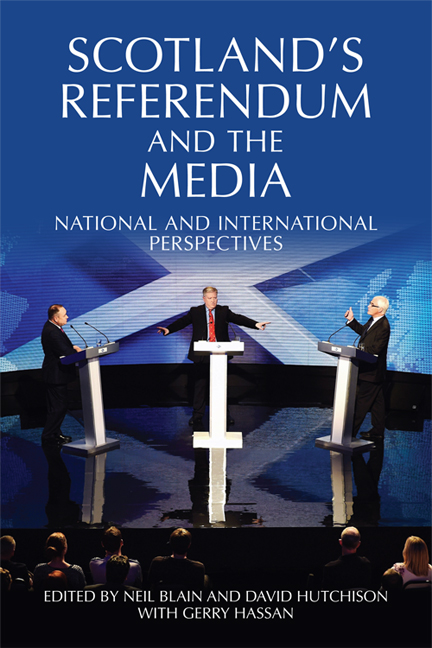Book contents
- Frontmatter
- Contents
- Preface
- Part One The Referendum in Scotland
- Part Two Views from the UK
- Part Three International Perspectives
- 13 ‘Knock-on Consequences’: Irish Media Coverage of the Scottish Referendum
- 14 Spain, Catalonia and the Scottish Referendum: A Study in Multiple Realities
- 15 The French View
- 16 The Scottish Referendum in Austrian, German and Swiss Media
- 17 The Scottish Referendum: The View from Quebec
- 18 The Scotland Referendum in the English-language Canadian Media
- 19 Australia and the Scottish Independence Referendum
- 20 Afterword: Reimagining Scotland in a New Political Landscape
- Notes on the Contributors
- Index
13 - ‘Knock-on Consequences’: Irish Media Coverage of the Scottish Referendum
from Part Three - International Perspectives
Published online by Cambridge University Press: 05 August 2016
- Frontmatter
- Contents
- Preface
- Part One The Referendum in Scotland
- Part Two Views from the UK
- Part Three International Perspectives
- 13 ‘Knock-on Consequences’: Irish Media Coverage of the Scottish Referendum
- 14 Spain, Catalonia and the Scottish Referendum: A Study in Multiple Realities
- 15 The French View
- 16 The Scottish Referendum in Austrian, German and Swiss Media
- 17 The Scottish Referendum: The View from Quebec
- 18 The Scotland Referendum in the English-language Canadian Media
- 19 Australia and the Scottish Independence Referendum
- 20 Afterword: Reimagining Scotland in a New Political Landscape
- Notes on the Contributors
- Index
Summary
Introduction
The focus on recent relations between Scotland and the Irish Republic has been on economic matters, notwithstanding historical ties including common membership of the United Kingdom until the passing of the Anglo-Irish Treaty in 1922. The strong performance of the Irish economy from the mid-1990s until 2008 attracted considerable interest in Scotland and, in particular, from the Scottish National Party (SNP).
At the outset of Tony Blair's premiership in 1997, and New Labour's election promise to offer Scottish voters a choice on devolution, SNP leader Alex Salmond took encouragement from Ireland's nascent boom. Writing in the Irish Times in May 1997, Salmond made explicit reference to economic matters in building his case, not just for a Scottish Parliament under the Blair proposals but also for independence: ‘Looking across from Scotland we see what a small nation, mobilising its own resources, can achieve, and we reflect on our own indifferent economic performance’.
The SNP leader articulated an argument that would become a familiar refrain over the following decade as Ireland's economic performance continued to dazzle national and international observers:
In Scotland, we can only envy Ireland's access to Europe's top table, just as we can only envy Ireland's international visibility and all the advantages in tourism and investment – not to mention self respect – which go with it.
The Irish success story was a regular reference point for newspaper headline writers who sought to capture what Ireland's economic boom could, apparently, teach the Scots. Examples included: ‘The Celtic Tiger has a playmate, a Caledonian cub; and ‘After the Celtic Tiger, is the Scottish Tiger far behind?’. Moreover, as the boom times continued – we were told – the politicians at Holyrood were still ‘casting an envious eye to the Celtic Tiger’.
Ireland's economic growth was, in part, facilitated by low interest rates that followed entry into the eurozone and domestic banks having increased access to less expensive credit. Investment decisions, especially from 2002 onwards, were heavily motivated by a belief that local property demand would remain strong and values would continue to increase. Foreign banks were also enticed into the booming Irish market, among them high street leaders from Edinburgh including Royal Bank of Scotland (RBS) and Halifax/Bank of Scotland.
- Type
- Chapter
- Information
- Scotland's Referendum and the MediaNational and International Perspectives, pp. 147 - 158Publisher: Edinburgh University PressPrint publication year: 2016



